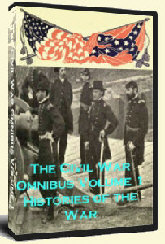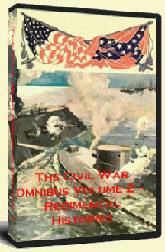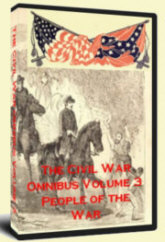A boastful man of questionable morals, and one of the more irascible figures of the Civil War era, Union General Joseph Hooker also gained a reputation as an officer beloved by his men but reviled by almost everyone else.
Born in Massachusetts, Joseph Hooker attended the United States Military Academy, graduating in 1837. Hooker served under both Zachary Taylor and Winfield Scott during the Mexican-American War, gaining several promotions. He also gained a reputation with the local senoritas, who referred to him as “the Handsome Captain.” This predilection for the company of ladies would follow Hooker throughout his life.
Although well-suited to the military life, Hooker resigned his commission in 1853, his reputation in shambles due to the fact that he had testified against General Winfield Scott in a court-martial against Gideon Pillow. Settling in California, Hooker ostensibly began a career as a land developer and farmer; however, his main occupations were drinking and gambling. Read the rest of this entry »
Comments Off on Joseph Hooker – the Reluctant “Fightin’ Joe”
The modern U.S. army has a wide array of food products available to them in base camps and in the field. There are a large number of MREs (which are actually quite tasty) and other portable foods available to them when on missions and when stationed in hostile terrain. And when posted at an established base camp, the food that is prepared is also quite good. A large part of this is of course the ready availability of large quantities of any sort of food imaginable in today’s modern environment. In fact, today’s soldiers have the best food ever made available to a fighting force.
But it wasn’t always that way. Read the rest of this entry »
Comments Off on Civil War Food – What Union and Confederate Soldiers Ate
The Confederacy was between a rock and a hard place in 1863. Lee was being thwarted in the East, while Vicksburg was besieged to the West. Perhaps a diversion was needed, something to create havoc on the border and in the North, and distract Federal troops. John Hunt Morgan had just the plan. The only problem was, he didn’t have the orders to carry it out.
John Hunt Morgan’s plan to divert attention from the eastern and western theatres of the war resulted in Morgan’s Raid, or the Great Raid of 1863, during which Morgan and a hand-picked cavalry stormed through his home state of Kentucky, then onto Indiana and Ohio, terrorizing soldiers and pro-Union civilians alike and creating a well-publicized trail of destruction in their wake. However, the raid, which was either a success or a momentary aggravation, depending on which side you were on, did little to advance either the Confederacy or John Hunt Morgan. Read the rest of this entry »
Comments Off on Morgan’s Raid
It seemed to be an established fact that George McClellan was one of, if not the most ineffectual officer produced by either the Union or the Confederacy during the Civil War. Yet recently, some historians have begun to re-examine the legacy of McClellan, on the basis that while his mistakes were many, they may have been confounded by the fact that as a Democrat and a vacillator on the issue of slavery, McClellan’s disagreements and eventual break with Radical Republicans Abraham Lincoln and Secretary of War Edwin Stanton may have done more to end McClellan’s career than his own performance (or lack thereof) during the War.
Young Napoleon
At the outset of the Civil War, when McClellan was seen as a savior, the only man who could make soldiers out of the thousands of volunteers who’d come to fight the war, McClellan was favorably compared to Napoleon. Within the space of year, this comparison would seem all too apt. Read the rest of this entry »
Comments Off on George McClellan – A Mystery of the War
The Civil War began as an exercise of patriotism. The new Confederacy had no army to speak of, and hence had to depend on volunteers. The Federal Army was woefully undermanned, and President Abraham Lincoln issued a request for volunteers as soon as it was determined that war was inevitable. These volunteers were ready to fight for their country, but after a space of months – or even weeks in some cases – they were ready to leave the fighting to other men and return to their homes. The shortage of manpower on both sides meant that the first drafts in America’s short history were instituted.
The involuntary conscription of men into the Army seemed to fly in the face of the very tenets that the Constitution was based upon – liberty and the pursuit of happiness certainly didn’t go hand in hand with a draft. However in both the Union and the Confederacy, civil war also meant a suspension of civil liberties for men of an age to fight. Read the rest of this entry »
Comments Off on Rich Man’s War, Poor Man’s Fight – The Draft and the Civil War


